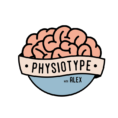Find Out More
What is Physiotype?
Physiotype is a method of inferring personality type from facial features, gait, the way someone sounds, the way they walk, and physiological traits. It is also a system of categorizing people into personality types, similar to the way MBTI and other Jungian systems do.
Physiotype system has several potential benefits. By determining someone’s personality type based on their physical features, such as facial features and gait, Physiotype could be useful in predicting their behavior. For example, individuals who are classified as the Delta Class Type (ENTJ & INTJ in MBTI and other personality type systems) are more likely to work in the programming field.
Additionally, Physiotype could help in predicting a newborn’s personality, as it is believed to have some hereditary component, although the exact nature of this component (whether it is

genetic or epigenetic) is still unknown. Furthermore, Physiotype could potentially be used during job interviews to gauge an individual’s personality just by looking at their face.
While the Physiotype system is not a scientifically proven theory yet, it is still considered useful. With the ongoing testing and experimentation of the hypothesis, Physiotype could eventually be considered scientific evidence for the existence of the cognitive functions proposed by Carl Jung.
In conclusion, learning the Physiotype system could offer several benefits such as better predictions of behavior, personality, and career choices based on physical features, as well as a deeper understanding of the theories of personality and cognitive functions proposed by Carl Jung. That is not to say that Physiotype is incredibly diagnostic for an individual person. These are averages. We aren’t hopeful that using Physiotype to type a single person is going to be useful for inferring a lot about that person. It’s more powerful on averages. This is because the way that you’re raised, your culture, free will—those things are generally larger influencers than your Physiotype.
See also the Conceptual and Social functions.
The Three Dichotomies
Class and Object Personality Types
Class and Object is similar to Jungian Sensing and Intuition. Object Types are object-oriented and Class Types are class-oriented.
Prone and Supine Personality Types
Prone and Supine are roughly analogous to Jungian Thinking and Feeling. Prone people are highly disagreeable. Supine people are very agreeable.
Meta and Mesa Personality types
Meta and Mesa does not relate to any specific Jungian dichotomy. Meta is interested in the parts of the whole and deconstructs an entity. Mesa is interested in the whole and will treat a group of things as a unique entity.
Find Out Your Personality Type
Having trouble figuring out your Physiotype? Want to see if your Physiotype matches your MBTI or Socionics type?
